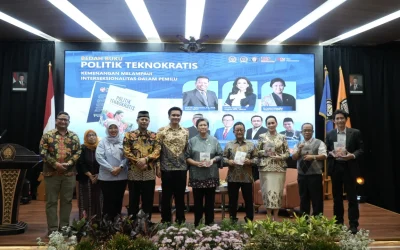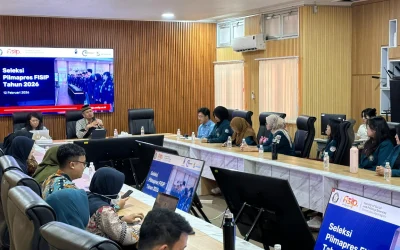FISIP UNDIP, Semarang (2/7) – A journal titled “Implementasi E-Government dalam Pelayanan Publik (Studi Kasus Penyelenggaraan KTP Elektronik di Kecamatan Pulomerak)” (Implementation of E-Government in Public Services: A Case Study of Electronic ID Card Services in Pulomerak District), conducted by Dr. Dra. Augustin Rina Herawati, M.Si., discusses the implementation of e-government in public services in Indonesia, particularly regarding electronic ID cards (e-KTP) in Pulomerak District. This research aimed to evaluate the implementation of e-KTP services using indicators of accountability, participation, orderliness, and timeliness. The results showed that the implementation of e-KTP services in Pulomerak had not been fully effective. Limitations in human resources and technical facilities are the main obstacles to achieving optimal service.
Using a qualitative approach and data collection through a literature review, the journal reveals that although there has been some progress in e-government-based administrative systems, challenges such as insufficient socialization and inadequate infrastructure, including unstable electricity and limited computer availability, remain significant issues. These directly impact the quality of services received by the public.
Another important finding in the journal is the frequent delays in the e-KTP recording process, which are often complained about by the community. The use of manual mechanisms due to technical limitations further complicates the process and prolongs completion times. Residents often have to wait 3-4 months to receive their e-KTPs, primarily due to shortages of forms and insufficient service facilities.
Source: Hariyati, A. M. S., Nurayuni, I., Sa’diyah, I. S., Herawati, A. R., & Kismartini, K. (2022). Implementasi E-Government dalam Pelayanan Publik (Studi Kasus Penyelenggaraan Pelayanan KTP Elektronik di Kecamatan Pulomerak). Jurnal Manajemen Dan Ilmu Administrasi Publik (JMIAP), 4(3), 203-208.
The study concludes that although many challenges remain, efforts are being made to improve e-KTP services in Pulomerak. The authors suggest that local governments enhance the quality of human resources and improve technical infrastructure to ensure more efficient and effective services in the future.
As background, the author of the journal “Implementasi E-Government dalam Pelayanan Publik (Studi Kasus Penyelenggaraan KTP Elektronik di Kecamatan Pulomerak)” is a lecturer in the Department of Public Administration at Universitas Diponegoro, who holds a Bachelor’s degree from Universitas Diponegoro, a Master’s degree from the University of Indonesia, and a Doctoral degree from the University of Indonesia. One of the undergraduate courses she teaches in Public Administration is Policy Communication and Advocacy.
Translator:
Nur Inayah





0 Comments